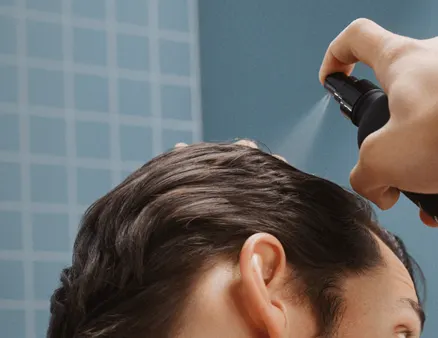Here's what we'll cover
Here's what we'll cover
For many people, stress is a natural part of daily life. Whether it’s physical or emotional, stress is inescapable. Sometimes, even positive parts of life can be sources of stress (called eustress). A little stress is okay, but too much can lead to other problems, including hair loss. Read on to learn about how stress can affect your hair.
Can stress cause hair loss?
It’s normal to lose around 50–100 strands of hair a day. But stress can significantly affect your hair and lead to hair loss (aka alopecia) regardless of gender, age, or race. Experts don’t know precisely how many people experience hair loss due to stress, but they estimate that many adults have had stress hair loss at some point in their lives (Hughes, 2021).
Telogen effluvium
The most common type of stress-related hair loss is telogen effluvium (TE). During TE, your hair stops growing for a few months, and then you suddenly notice excess hair shedding. It can happen in response to psychological or physiological stressors. Physiological stress refers to changes in your body, including (Hughes, 2021):
Pregnancy and postpartum changes
Hormonal changes, like menopause and thyroid problems
Infections, like COVID-19
High fevers
Extreme weight loss
Low protein diet
Nutrient deficiencies (e.g., iron deficiency)
Trauma or surgery
Side effects of certain medications
Alopecia areata
Alopecia areata is a medical condition where your immune system attacks your hair follicles, causing patchy hair loss. We don’t know why people get alopecia areata, but stress is a potential trigger (Lepe, 2021).
Effects of stress on hair
When your body is under stress, it can disrupt the normal hair growth cycle. Typically, your hair cycles through a growth phase (anagen), transition phase (catagen), and resting phase (telogen). After resting, the hair falls out and the cycle begins again.

Under normal conditions, approximately 85–90% of your hair is in the growth phase, with only around 10% in the resting phase. Usually, a hair follicle grows for almost four years, then rests for about four months. Stress pushes more of your hair into the resting phase. After a stressor, you may notice your hair not growing as much as it used to. Three to four months later, all of that hair in telogen falls out, and you get sudden and excessive hair shedding (Hughes, 2021).
So why does this happen? Animal studies suggest that it may have to do with higher cortisol (“stress hormone”) levels circulating in the body in response to physiological or emotional stress. Stress hormones keep the hair follicles in the resting phase longer, preventing hair regrowth and contributing to hair thinning (Choi, 2021).
How long does telogen effluvium last?
Telogen effluvium typically starts around three months after the event and usually lasts for six months or less. Once the source of the stress is gone, your hair growth often returns to normal, commonly without any special treatment. However, if the cause of your stress-induced hair loss is a chronic illness, you may not notice improvement until your medical issue has been treated (Hughes, 2021).
How to regain hair loss from stress
The best way to treat telogen effluvium is to find the underlying cause. Once that is taken care of, you’ll notice improved hair growth. If you think your hair loss may be from a medication, talk to your healthcare provider about alternatives before stopping your treatment regimen.
You can encourage healthy hair growth by eating a healthy, balanced diet and maintaining good hydration. If you have a nutrient deficiency, talk to your provider about nutritional supplements to correct the issue (Guo, 2017).
Stress management
You can reduce stress levels and improve hair health with simple lifestyle changes, including (McEwen, 2017):
Exercising regularly
Avoiding smoking, drugs, and excessive alcohol intake
Improving sleep habits
Developing support networks
Practicing mindfulness techniques
Therapy can also be very helpful in managing chronic stress.
Hair loss treatments
Minoxidil and finasteride are both effective hair loss treatments for certain types of hair loss. Minoxidil (brand name Rogaine) is a topical medication that you apply directly to the scalp. It is approved for men and women with androgenic alopecia (aka male pattern hair loss or female pattern hair loss). Finasteride (brand name Propecia) is an oral pill that you take daily to slow hair loss and encourage regrowth. It’s only approved for use in men.
Most people with telogen effluvium do not necessarily need hair loss treatments since their symptoms tend to be temporary. Also, these treatments do not address the underlying cause of stress-induced hair loss. Some people may decide to try hair loss treatments if they have a hard time reversing their symptoms. Many hair loss products are not proven to help people with stress-related hair loss telogen effluvium.
If your stress has led to alopecia areata, you may need additional treatments like corticosteroids, either applied topical or injected into the scalp of the balding areas (Lepe, 2021).
While it can be very distressing to lose hair on top of the other stressors in your life, know that it may take time, but stress-induced hair loss will usually grow back.
Oral Minoxidil Important Safety Information: Read more about serious warnings and safety info.
Finasteride Important Safety Information: Read more about serious warnings and safety info.
DISCLAIMER
If you have any medical questions or concerns, please talk to your healthcare provider. The articles on Health Guide are underpinned by peer-reviewed research and information drawn from medical societies and governmental agencies. However, they are not a substitute for professional medical advice, diagnosis, or treatment.
Choi, S., Zhang, B., Ma, S., et al. (2021). Corticosterone inhibits GAS6 to govern hair follicle stem-cell quiescence. Nature , 592 (7854), 428–432. doi:10.1038/s41586-021-03417-2. Retrieved from https://pubmed.ncbi.nlm.nih.gov/33790465/
Guo, E. L. & Katta, R. (2017). Diet and hair loss: effects of nutrient deficiency and supplement use. Dermatology Practical & Conceptual , 7 (1), 1–10. doi:10.5826/dpc.0701a01. Retrieved from https://www.ncbi.nlm.nih.gov/pmc/articles/PMC5315033/
Hughes, E. C. & Saleh, D. (2021). Telogen effluvium. StatPearls . Retrieved on May 3, 2022 from https://www.ncbi.nlm.nih.gov/books/NBK430848/
Lepe, K. & Zito, P. M. (2021). Alopecia areata. StatPearls . Retrieved on May 3, 2022 from https://www.ncbi.nlm.nih.gov/books/NBK537000/
McEwen, B. S. (2017). Neurobiological and systemic effects of chronic stress. Chronic Stress , 1 , 2470547017692328. doi:10.1177/2470547017692328. Retrieved from https://pubmed.ncbi.nlm.nih.gov/28856337/










